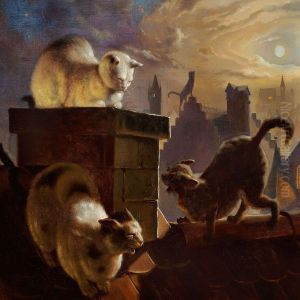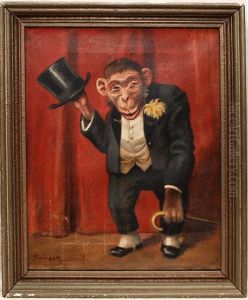Fedor Flinzer Paintings
Fedor Flinzer, also known by his full name Friedrich Karl Fedor Flinzer, was a German illustrator and writer who made a significant contribution to children's literature and education during the late 19th century. Born on November 4, 1832, in Reichenbach im Vogtland, Saxony, his artistic talents became evident at an early age. He pursued his passion for art by studying at the Academy of Fine Arts in Dresden and later in Munich. Flinzer is most renowned for his work in developing picture books for children.
After completing his studies, Flinzer worked as a drawing teacher, which allowed him to hone his skills in illustration. His approach to art was characterized by a combination of humor and morality, often portraying animals in anthropomorphic scenarios. Flinzer's work was part of a larger trend in 19th-century Europe that saw the rise in popularity of illustrated children's books. These books served not only as entertainment but also as educational tools, using stories and images to teach children about virtues and social norms.
Flinzer became a prolific illustrator, contributing to numerous publications and creating a vast array of drawings and designs. He was particularly adept at wood engraving, a popular technique of the time that allowed for the mass production of illustrated texts. One of his most famous creations was the character 'Reineke Fuchs' (Reynard the Fox), which he depicted in a series of illustrations. These images were widely circulated and contributed to his reputation as a leading illustrator in Germany.
Throughout his career, Flinzer collaborated with authors and educators to produce content that was both engaging and instructive for children. His illustrations often accompanied texts by prominent writers, helping to bring their stories to life. Flinzer's influence extended beyond his own works as he also contributed to the improvement of teaching methods through his involvement in teacher training and curriculum development.
Fedor Flinzer passed away on June 14, 1911, in Loschwitz near Dresden. His legacy continues in the form of his enduring illustrations and his impact on the field of children's literature. Flinzer's work remains a testament to the importance of visual art in education and the development of the illustrated book as a means of storytelling and moral instruction.

